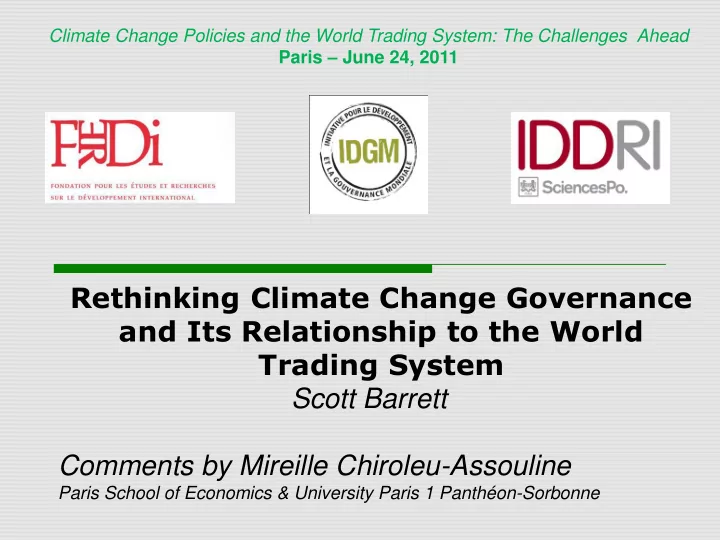

Climate Change Policies and the World Trading System: The Challenges Ahead Paris – June 24, 2011 Rethinking Climate Change Governance and Its Relationship to the World Trading System Scott Barrett Comments by Mireille Chiroleu-Assouline Paris School of Economics & University Paris 1 Panthéon-Sorbonne
A brief summary So far, climate change policy has avoided to use trade restrictions, but it is ineffective…and actually poses a threat to the trade system The most effective international environmental agreements (Helsinki, Montreal) have incorporated trade restrictions Introduce trade restrictions into the climate change policy after 2012 Trade restrictions have been until now only considered as patches to avoid detrimental side effects of the climate policy In other IEAs, they were considered as incentives to join the agreement Use trade restrictions as a deterrent force rather than as an offensive nuclear weapon Mireille Chiroleu-Assouline Climate Change Policies and the World Trading System Paris – June 24, 2011
A brief summary Re-designing a world climate policy by drawing inspiration from other IEAs, especially from Montreal Protocol Use trade restrictions between parties and non-parties as a credible threat (North Pacific Fur Seal Treaty, Montreal Protocol) Ban of imports containing controlled substances (Montreal Protocol): limits both production and consumption Implement technical and technological standards (MARPOL, ICAO) Global standards rather than differentiated (cause of success for Montreal, cause of failure for the Kyoto Protocol) Mireille Chiroleu-Assouline Climate Change Policies and the World Trading System Paris – June 24, 2011
Scott Barrett’s Proposal Re-designing a world climate policy by drawing inspiration from other IEAs, especially from Montreal Protocol Subdivide the problem into partial agreements Adopt an effectiveness approach (best means for achieving each sub- objective) « second best » solution Mireille Chiroleu-Assouline Climate Change Policies and the World Trading System Paris – June 24, 2011
Scott Barrett’s Proposal Make use of the Montreal Protocol (and of its trade restrictions) as a climate agreement since HFCs are GHG by-products of HCFC controlled by Montreal through the proposed expansion amendment to directly control HFCs Implement technical and technological standards fuel and airplanes standards + CO2 emissions standards to reduce aviation emissions technological standards in iron and steel industries + ban on non complying imports + R&D subsidies ban internal combustion engines to control automobile emissions promote carbon capture and storage (R&D subsidies) Mireille Chiroleu-Assouline Climate Change Policies and the World Trading System Paris – June 24, 2011
A pragmatic but provocative proposal for economists Fairness and effectiveness at the expense of efficiency Standards do not allow to minimize the abatement cost of the policy The breaking down of the problem implies different abatement costs between sectors Even effectiveness is not guaranted Technological standards tend to lock-in: no real incentives to invest in R&D to do better + evolution will need further negotiations Emission standards cannot deter the increase of emissions due to the increasing demand (automobile, air transport) To promote carbon capture and storage in electricity generation will hamper investment in renewable energies and accelerate fossil fuels exhaustion Mireille Chiroleu-Assouline Climate Change Policies and the World Trading System Paris – June 24, 2011
Recommend
More recommend